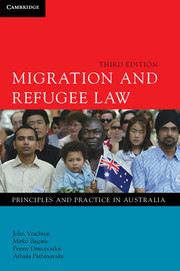Book contents
- Frontmatter
- Contents
- Table of cases
- Table of statutes
- Preface to the third edition
- Acknowledgments
- 1 Historical context to migration
- 2 Immigration control: An overview
- 3 Basic migration legislation and policy
- 4 The visa system and application procedures
- 5 Family and interdependency migration and other Australia-based visas
- 6 Business and investment visas
- 7 Skills-based visas
- 8 Temporary visas
- 9 Miscellaneous visas
- 10 Common visa requirements
- 11 Compliance: Unlawful non-citizens, removal and deportation
- 12 History of the Refugees Convention and definitional framework
- 13 Refugee and humanitarian visas: The statutory structure
- 14 Convention grounds
- 15 Persecution
- 16 Well-founded fear of persecution
- 17 Limits on protection of refugees – cessation, exclusion exceptions and protection by another country
- 18 Time for a fundamental rethink: Need as the criterion for assistance
- 19 The determination and review process for migration and refugee decisions
- Index
- References
4 - The visa system and application procedures
Published online by Cambridge University Press: 05 June 2012
- Frontmatter
- Contents
- Table of cases
- Table of statutes
- Preface to the third edition
- Acknowledgments
- 1 Historical context to migration
- 2 Immigration control: An overview
- 3 Basic migration legislation and policy
- 4 The visa system and application procedures
- 5 Family and interdependency migration and other Australia-based visas
- 6 Business and investment visas
- 7 Skills-based visas
- 8 Temporary visas
- 9 Miscellaneous visas
- 10 Common visa requirements
- 11 Compliance: Unlawful non-citizens, removal and deportation
- 12 History of the Refugees Convention and definitional framework
- 13 Refugee and humanitarian visas: The statutory structure
- 14 Convention grounds
- 15 Persecution
- 16 Well-founded fear of persecution
- 17 Limits on protection of refugees – cessation, exclusion exceptions and protection by another country
- 18 Time for a fundamental rethink: Need as the criterion for assistance
- 19 The determination and review process for migration and refugee decisions
- Index
- References
Summary
Validity of visa applications
As described in the previous chapter, the Migration Act 1958 (Cth) provides that non-citizens must only travel to and enter Australia with a visa. Otherwise they will be refused entry or, if they manage to enter, will be unlawful non-citizens, and subject to removal. For the purposes of obtaining a visa, section 45 requires non-citizens to apply for a visa of a particular class, section 47 imposes a duty on the Minister to consider valid applications, and section 65 provides that the Minister, having considered a valid application for a visa, must grant the application if satisfied it meets the relevant criteria, including health criteria and other statutory requirements, and must refuse it if not so satisfied.
Section 46 establishes conditions for the validity or invalidity of a particular visa application, largely by way of providing that the regulations may prescribe criteria to be satisfied for an application to be valid (see regulation 2.07 and Schedule 1). In brief, a valid application must be made on the approved form and in accordance with the directions on the form; be for a specified class of visa; provide correct information; and be lodged at the specified place. The applicant must have paid the appropriate visa application charge (if any) and must not be prevented by legislation from making the application or an entitlement to the particular visa. These rules are reflected in Schedule 1, which sets out the prescribed form; the visa application charges; the place and mode of lodgment; how members of the applicant's family unit might be included; and often, where the applicant must be at the time of lodging the application.
- Type
- Chapter
- Information
- Migration and Refugee LawPrinciples and Practice in Australia, pp. 32 - 52Publisher: Cambridge University PressPrint publication year: 2011



